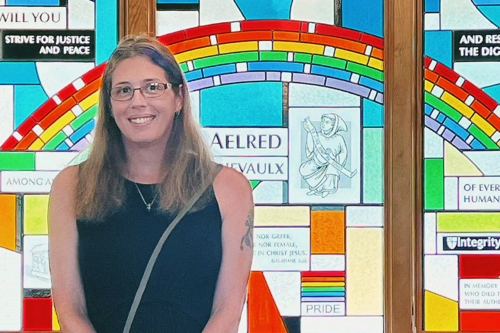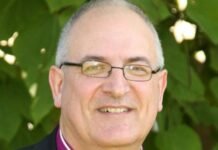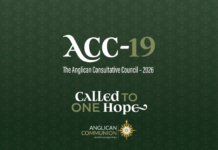Renaming liturgy offers a blessing to North Dakota woman and her new name
[Episcopal News Service] It’s not often that a 21st-century Episcopalian knows they are standing in the footsteps of Biblical patriarchs and matriarchs, but that’s the feeling Andrea Olsen had during a July 9 liturgy that affirmed the name she chose when she came out as a trans woman four years ago.
The service took place at St. Stephen’s in Fargo, North Dakota, with half a dozen of her closest friends – people she calls her chosen family – joining parishioners for the service.
Olsen told Episcopal News Service she knew the Bible is filled with stories of people who had received new names from God, including Abraham (formerly Abram), Sarah (Sarai), Peter (Simon) and Paul (Saul). And hers isn’t the first new name in her family, as her paternal grandfather changed his name from Franzick Osinski to Frank Olsen in the early 1900s a few years after he immigrated to the United States from Poland.
The Rev. Jamie Parsley, the church’s rector, told ENS he immediately thought of Olsen when he saw “A Service of Renaming” in the print edition of the 2022 Book of Occasional Services. The service is designed to be used “when an event or experience leads a baptized person to take or to be given a new name.” Parsley said he suggested it to Olsen because the process of legally changing her name was complex, and he thought this would be “a beautiful reward” after its completion. He also told her it would offer “a public recognition of your new name, and a blessing on your name.”
The liturgy was authorized by General Convention in 2018 after the creation of such a service was proposed by General Convention in 2015. For some, including Parsley, it went unnoticed until it was printed in the 2022 Book of Occasional Services.
Participating in this liturgy was particularly special to Olsen because even though her name had been changed legally, this showed that it now was recognized “in the eyes of God,” she said. Parsley said he thinks hers was the first use of this liturgy in the Diocese of North Dakota, although other churches have used it since it was adopted.
Olsen moved to Fargo in the early 2000s when stationed there with the U.S. Air Force. She had been away from church for two decades, and once she sought to return, she wasn’t sure where she could go and be accepted as a trans person. But when she and a former girlfriend were looking for a church home, she was drawn to St. Stephen’s in part because her father was an Episcopalian and also because she knew the church was LGBTQ+ friendly and that it participated in the local Pride parade. She wasn’t disappointed by what she found. “I have been extremely supported there,” she said. “Everyone is accepting and loving.”
Parsley said the church tries to go beyond being friendly to the queer community. “We seek to be LGBTQ+ affirming,” he said, adding that about a dozen LGBTQ+ members are among the 200 or so parishioners. Parsley said the church long has been a progressive spot in a conservative diocese, including standing up for women’s rights in the 1970s, gay rights in the 1980s and now trans rights. In 2015, the parish sought a “Delegated Episcopal Pastoral Oversight” arrangement so the parish could perform weddings for same-sex couples, which their then-bishop didn’t permit.
The acceptance Olsen finds at St. Stephen’s isn’t available from all members of her family, she said. Her father is supportive, as is an aunt, an uncle and one of her brothers who, she said, is dating a trans man. But, she said, her mother, who holds more politically conservative, is not.
The renaming service came at a time when anti-trans sentiment and legislation is increasing nationwide. The North Dakota legislature, for example, recently adopted 10 laws that target transgender children especially, including a ban on new gender-affirming care for minors and on some transgender athletes.
All of it, however, points to what makes liturgies like the renaming service so important, Parsley said. “The language affirmed her and all that she is doing,” he said, “and it was the larger church affirming that. We were just part of something the church already had begun.”



